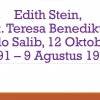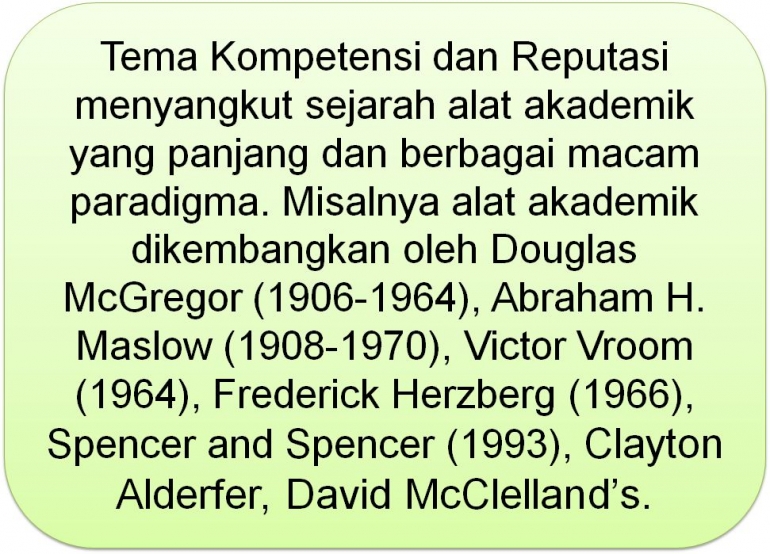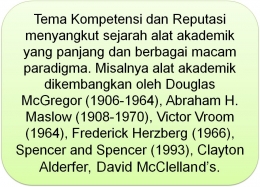Trans Substansi Filsafat dan Reputasi Perusahaan [7]
Tulisan ini adalah hasil penelitian Apollo Daito, dan Pia Oliang MS (2015) tentang beberapa factor yang dapat mempengaruhi reputasi perusahaan. Mengacu pada aspek aksiologi akuntansi yakni menyangkut kebaikan manusia sebagai manusia dalam penjewantahan kegunaan ilmu (= sains), sebagai penciri persatuan alam, manusia, dan Tuhan.
Untuk membentuk reputasi perusahaan maka diperlukan tipe apa yang disebut "Kompetensi". Tanpa kompetensi tidak ada yang disebut prestasi, kinerja, reputasi, laba, nama baik atau hasil buah yang baik. Secara filologi kata ini dipopluerkan pada tahun 1790, meaning sufficiency to deal with what is at hand. Competence and competency come from the Latin competentia, meaning meeting together, agreement, symmetry. Sama dengan perjumpaan dengan semua hal untuk bersama sama. Pertemuan dengan banda objek atau unsur lain yang akan membentuk sesuatu yang berguna bermanfaat. Jadi kompetensi adalah berguna, dan baik itu adalah berguna.
Lalu bagimana tema kompetensi seperti pada tulisan ke [6] sebelumnya dapat diwujukan secara episteme. Dengan meminjam berbagai peralatan akademik saya dapat menjelaskan proses sejarah berpikir yang mewujukkan hubungan atau korelasi antara reputasi perusahaan dengan kompetensi.
Tema Kompetensi dan Reputasi menyangkut sejarah alat akademik yang panjang dan berbagai macam paradigma. Misalnya alat akademik dikembangkan oleh Douglas McGregor (1906-1964), Abraham H. Maslow (1908-1970), Victor Vroom (1964), Frederick Herzberg (1966), Spencer and Spencer (1993), untuk dijabarkan dalam: (1) knowledge component, (2) psychological traits, (3) cognitive abilities, (4) decision strategies, dan (5) task analysis dapat diukur dengan menggunakan beberapa indikator, meliputi : (a) pengetahuan umum dan khusus, (b) memperoleh fakta-fakta yang relevan, (c) tanggung jawab, (d) kemampuan bekerja sama, (e) mampu berpikir secara sistematis, (f) memiliki kemampuan analisis, (g) objektifitas pengambilan keputusan, (h) independensi pengambilan keputusan, (i) skeptisme yang profesional, serta (j) kemampuan teknis yang memadai.
Pertama {1}, Kompetensi (historical development) Menurut Model Clayton Alderfer. Clayton Alderfer menggunakan teori motivasi ERG (Existence, Relatedness, and Growth) pada kebutuhan manusia: akan keberadaan (exsistence) mempedulikan pemberian persyaratan eksistensi materiil dasar kita. Mencakup butir-butir oleh Maslow sebagai kebutuhan faali dan keamanan, hubungan (relatedness) kelompok keterkaitan-hasrat untuk memelihara hubungan antar pribadi yang penting.
Hasrat sosial dan status menuntut interaksi dengan orang-orang lain agar terpuaskan, dan hasrat-hasrat ini sejalan dengan kebutuhan sosial Maslow dan komponen eksternal klasifikasi penghargaan Maslow. Pertumbuhan (growth), suatu hasrat intrinsik perkembangan pribadi. Ini mencakup komponen intrinsik kategori penghargaan Maslow dan karakteristik-karakteristik tercakup pada aktualisasi-diri.
Kedua (2) Kompetensi (historical development) Menurut Model David McClelland's. Pertanyaaan David McClelland's adalah "membedakan antara kinerja tinggi dengan kinerja rata-rata" atau what is it that differentiates strong performers from average performers". The competency paradigm is simply one way to break behavior down into its component parts. Workers are motivated by needs that are acquired or developed as a result of individual life experience.
Pada tahun 1961 McClelland's menulis tentang "The Achieving Society". Sedangkan karya McClelland's berturut turut sebagai berikut : The Achievement Motive (1953), The Achieving Society (1961), The Roots of Consciousness (1964), Power: The Inner Experience (1975), Human Motivation (1987). McClelland, 1961: 104-105 "Psychologically speaking, what such findings seem to mean is that n achievement is not only more frequently present in stories from more rapidly developing countries but when it is present, it is more apt to be "means" oriented rather than goal oriented. The achievement sequence more often dwells on obstacles to success and specific means of overcoming them, rather than on the goal itself, the desire for it, and the emotions surrounding attaining or failing to attain it.
The adaptive quality of such a concern with means is obvious: a people who think in terms of ways of overcoming obstacles would seem more likely to find ways of overcoming them in fact. McClelland's Acquired Needs Theory proposes that people acquire needs through their life experiences. He uses a Thematic Apperception Test (TAT) to measure the strengths of three acquired needs: Achievement, Power, Affiliation. Need for Achievement (nAch), the desire to do something better or more efficiently, to solve problems, or to master complex tasks. Need for Power (nPower), the desire to control other persons, to influence their behavior, or to be responsible for other people. A finer distinction can be made between: the need for Personal Power and, the need for Sosial Power. Need for Affiliation (nAff), the desire to establish and maintain friendly and warm relations with other persons.
Mc Clelland (1961), menyatakan ada tiga hal penting menjadi kebutuhan manusia, yaitu: (a) need for achievement (kebutuhan akan prestasi), (2) need for afiliation (kebutuhan akan hubungan sosial/hampir sama dengan sosial need-nya Maslow), (3) need for power (dorongan untuk kekuasaan). Need for Achievement -- individuals with a high need of this will seek job having individual responsibility for results, challenging but attainable goals for themselves and feedback on their performance (1) they have a need to excel & will seek out situations where there is an element of risk or even a possibility of failure (jobs in professional athletics, DI, director of sports medicine clinics) They need a challenge, Need for Power -- these individuals enjoy being "in charge" & place more importance on making others conform to their expectations on gaining public recognitions than they do in competence at a particular task. The need to influence others' behavior for the good of the organization predominates. Need for Affiliation -- these individuals are motivated by the need for close interpersonal relationships, companionship, sosial approval in the workplace. Interested in the morale of their patients/assistants than in completing a task on time, Often, these individuals will avoid confrontation rather than making an unpopular decision (work in one-on-one situations)










